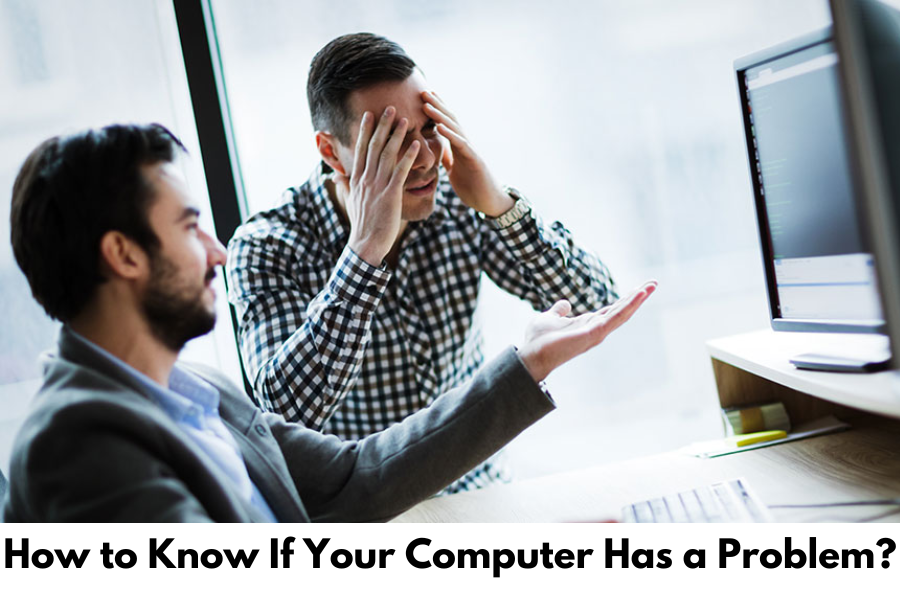In today’s digital world, computers have become an integral part of our lives, serving as essential tools for work, communication, and entertainment. However, like other machine, computers can sometimes experience issues that can disrupt our productivity and cause frustration. Recognizing these issues early on is crucial to prevent more significant damage and ensure your computer’s longevity. In this comprehensive guide, we’ll explore various signs that indicate your computer might have a problem and provide insights on how to address these issues effectively.
Slow Performance and Freezing
Modern computer users expect fast and responsive performance, but over time, computers can become sluggish due to various reasons. Insufficient RAM, a cluttered hard drive, or excessive background processes could be causing this issue.
Extended Startup Times
If your computer takes an unusually long time to start up, it could indicate that there are too many applications running at startup or that there’s a potential software conflict. This can slow down your overall system performance.
Unresponsive Programs
Are your programs freezing or becoming unresponsive frequently? This could be due to insufficient RAM, software conflicts, or malware. These issues can impact your productivity and overall user experience.
Slow Internet Browsing
A sudden decrease in internet browsing speed could be related to malware, a crowded cache, or issues with your network connection. Slow internet can be frustrating and hinder your online activities.
Strange Noises and Hardware Issues
Beyond performance-related issues, your computer’s hardware might also exhibit signs of problems. Pay attention to the following:
Unusual Noise
A healthy computer operates quietly in the background. If you start hearing grinding, clicking, or buzzing sounds, it’s a clear indication that there might be a hardware issue. These noises could be coming from your hard drive, cooling fan, or power supply. Back up your important data immediately and consult a professional technician to diagnose and resolve the problem.
Frequent Crashes or Freezes
Experiencing frequent system crashes or freezes can be incredibly frustrating. These issues could be caused by software conflicts, driver problems, or hardware malfunctions. Update your drivers, ensure your operating system is up-to-date, and make sure your computer isn’t overheating. If the problem persists, consider seeking expert assistance.
Blue Screen of Death (BSoD)
Encountering the infamous Blue Screen of Death is a surefire sign of a serious problem. This blue screen with white text usually indicates critical system errors that require immediate attention. Note down the error message displayed and restart your computer. If the BSoD continues to appear, it’s time to dig deeper into the issue.
Overheating
Computers generate heat during operation, but excessive heat can cause serious problems, such as reduced performance and hardware damage. Make sure your computer’s vents are clear of dust and debris, and consider using a cooling pad or ensuring proper ventilation in your workspace.
Data and Software Problems
Data is at the heart of most computer activities. If you notice anomalies in your data or software behavior, it’s time to investigate further:
Data Loss or Corruption
Unexpected data loss or corrupted files could point to failing hardware, malware infections, or software conflicts. Regular data backups can mitigate the impact of such issues.
Software Crashes
Frequent crashes of software applications could be due to compatibility issues, outdated software, or corrupted system files. Keeping your software up-to-date can help prevent such problems.
Strange Pop-ups and Ads
Unsolicited pop-up ads, especially those appearing even when you’re not browsing the internet, can be indicative of adware or potentially unwanted programs (PUPs). Ensure you have a reliable ad-blocker installed and run regular scans with reputable anti-malware software to keep these nuisances at bay.\
Taking Action and Seeking Help
When you encounter any of these signs indicating potential computer problems, it’s important to take appropriate action:
Perform Regular Maintenance
Regularly clean your computer’s hardware, update software, and run antivirus scans. This proactive approach can prevent many common issues.
Visit Computer Repair Shop
If you’re not comfortable diagnosing and resolving computer problems yourself, search online, Computer or Desktop Repair Near Me and check best shop and take help from a professional technician. They can provide expert guidance and solutions.
Back Up Your Data
Regularly back up your important data to an external source or cloud storage. This ensures that even if your computer experiences a catastrophic failure, your data remains safe.
Disclaimer: This Post is strictly intent to information only

